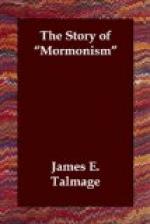To most of the declarations in the Articles of Faith, many sects professing Christianity could confidently pledge allegiance; to many of them, all Christian organizations could and professedly do subscribe. Belief in the existence and powers of the Supreme Trinity; in Jesus Christ as the Savior and Redeemer of mankind; in man’s individual accountability for his doings; in the acceptance of sacred writ as the Word of God; in the rights of Worship according to the dictates of conscience; in all the moral virtues;—these professions and beliefs are as a common creed in the realm of Christendom. There is no peculiarly “Mormon” interpretation, in the light of which these principles of faith and practise are viewed by the Latter-day Saints, except in a certain simplicity and literalness of acceptance—gross literalness, unrefined materialism, it has been called by some critical opponents.
The gospel plan as accepted and taught by the Latter-day Saints is strikingly simple; disappointing in its simplicity, indeed, to the mind that can find satisfaction in mysteries alone, and to him whose love for metaphor, symbolism, and imagery are stronger than his devotion to truth itself, which may or may not be thus embellished. The Church asserts that the wisdom of human learning, while ranking among the choicest of earthly possessions, is not essential to an understanding of the gospel; and that the preacher of the Word must be otherwise endowed than by the learning of the schoolmen. “Mormonism” is for the wayfaring man, not less than for the scholar, and it possesses a simplicity adapting it to the one as to the other. A few of the characteristically “Mormon” tenets may perhaps be profitably considered.
“Mormonism” affirms its unqualified belief in the Godhead as the Holy Trinity, comprising Father, Son, and Holy Ghost; each of the three a separate and individual personage; the Father and the Son each a personage of spirit and of immortalized body; the Holy Ghost a personage of spirit.
The unity of the Godhead is accepted in the literal fulness of scriptural declaration—that the three are one in purpose, plan and method, alike in all their Godly attributes; one in their divine omniscience and omnipotence; yet as separate and distinct in their personality as are any three inhabitants of earth. “Mormonism” claims that scriptures declaring the oneness of the Trinity admit of this interpretation; that such indeed is the natural interpretation; and that the conception is in accord with reason.
We hold that mankind are literally the spiritual children of God; that even as the Christ had an existence with the Father before coming to earth to take upon himself a tabernacle of flesh, to live and to die as a man in accordance with the fore-ordained plan of redemption, so, too, every child of earth had an existence in the spirit-state before entering upon this mortal probation. We hold the doctrine to be reasonable, scriptural and true, that mortal birth is no more the beginning of the soul’s existence than is death its end.




